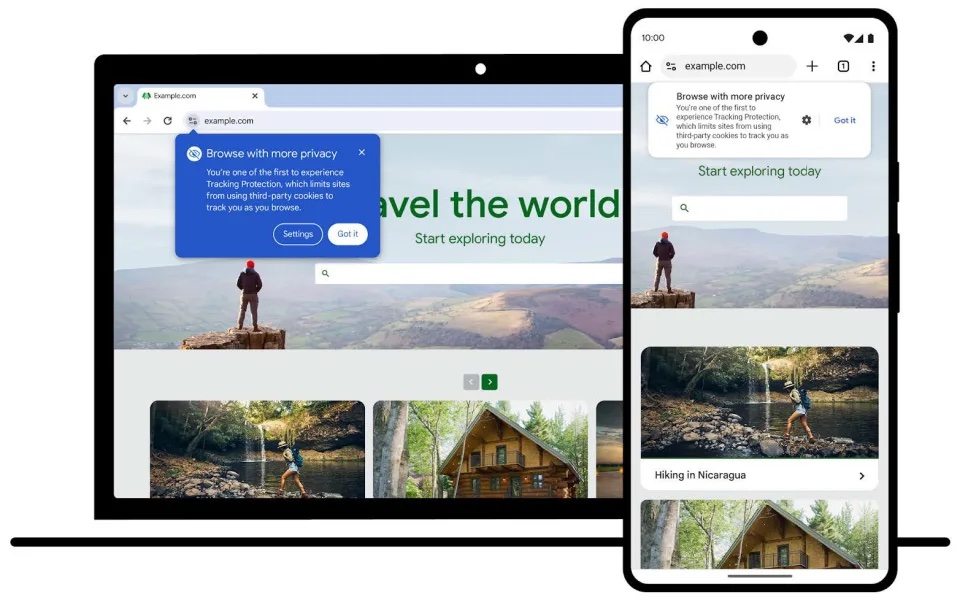Google has announced another postponement in the removal of third-party cookies from its Chrome browser, marking the third delay since the initial announcement.
Google’s decision comes amid ongoing regulatory reviews and feedback from various industry stakeholders, emphasising the complexity of transitioning away from a technology deeply embedded in digital advertising practices.
What Role Do Cookies Play In Online Marketing?
Cookies have been a fundamental part of online marketing since the mid-1990s. They were introduced by Netscape in 1994 to retain information between sessions on websites, such as user preferences and login states. From here other businesses quickly saw the potential of using cookies for marketing purposes, with cookies typically fuelling:
- Behavioural Tracking: Cookies track user behaviour across multiple websites, providing insights that help advertisers deliver more personalised advertising experiences.
- Retargeting: Cookies enable retargeting, which involves showing ads to users based on their previous internet activities. This is particularly effective in nudging users towards completing a desired action or purchase.
- Performance Measurement: They help measure the effectiveness of advertising campaigns by tracking actions users take after viewing or clicking on ads, such as making purchases or signing up for newsletters.
Originally set to phase out third-party cookies by 2022, Google extended the timeline to address concerns from the U.K.’s Competition and Markets Authority (CMA). The CMA has expressed significant worries about how the elimination of these cookies could potentially strengthen Google’s already dominant position in advertising technology, disadvantaging its competitors. In response, Google has engaged in extensive consultations with the CMA to refine its approach and ensure a fair competitive landscape.
Google’s Plan Has 39 Problems
The regulatory body has pointed out 39 specific issues with Google’s initial plan, necessitating a thorough examination and testing by the industry, scheduled to conclude by the end of June. The scrutiny from the CMA is part of a broader concern that Google’s proposed alternatives, notably the Privacy Sandbox initiative, might unfairly favour its own services at the expense of other publishers and ad-tech firms.
Google’s Privacy Sandbox aims to replace third-party cookies with a suite of privacy-preserving technologies that still allow targeted advertising but with greater user anonymity. Despite these efforts, the proposal has faced criticism for potentially creating a closed ecosystem that could exclude external demand- and supply-side platforms, further cementing Google’s market power.
Same Old Google, Always Delaying?
This ongoing delay has been met with mixed reactions across the advertising industry. While some industry leaders view the postponement as a necessary step to refine the new systems, ensuring they adequately replace the functionality of third-party cookies without compromising on privacy or competition, others are frustrated by what they see as Google’s procrastination. Critics argue that the industry has already begun to adapt to a post-cookie world, with some firms developing identity-free solutions to anticipate the change.
As Google works towards a new timeline, tentatively set for the end of 2024, some see the extra time as an opportunity for better preparation and testing, particularly for those within the industry who were unprepared for the original deadline, which—let’s be honest—was a significant proportion.
Daniel Konstantinovic, eMarketer, January 2024
“Google’s long-expected purge of third-party cookies has begun. The company turned off cookies for 1% of Chrome users last week, amounting to approximately 30 million users.
After a series of delays, Google has said it plans to phase out cookies for 100% of Chrome users by Q3 2024. If you’re a digital advertising professional, the end of third-party cookies is likely looming large this year.
Google has been warning advertisers about an end to third-party cookies for years, but as The Wall Street Journal puts it, they still aren’t ready.”
Preparing For The Eventual Cookie Removal
With the eventual demise of third-party cookies appearing inevitable, if not set in stone date wise, businesses need to start preparing now to mitigate any adverse effects on their marketing efforts:
- Explore Alternative Data Strategies: Businesses should explore new first-party data strategies, thereby building their own databases that can deliver insights similar to those provided by third-party cookies.
- Invest in Technology and Partnerships: Investing in new technologies and forming partnerships can help businesses adapt to changes in the advertising landscape. Solutions like unified IDs, which attempt to create common user identifiers across various platforms, or contextual advertising, which targets ads based on the content being viewed rather than user behaviour, are becoming more popular.
- Participate in Industry Tests: Engaging with industry tests of new technologies like those in Google’s Privacy Sandbox can provide early insights into how well these alternatives meet their needs compared to traditional cookies.
- Stay Informed and Flexible: The digital advertising industry is highly dynamic, with frequent changes in technology, regulation, and market trends. Companies should stay informed about these changes and remain flexible in their strategies to adapt quickly.
- Educate and Train Staff: As new tools and techniques emerge, marketing teams’ training will be essential to ensure they understand how to utilise these new methods effectively.
Google’s phased approach to removing third-party cookies highlights the intricate balance required to enhance consumer privacy while maintaining the economic viability of the digital advertising ecosystem.
By taking advantage of the delay to prepare adequately, businesses can ensure they remain competitive in a post-cookie world, leveraging new technologies to continue delivering targeted and effective advertising campaigns. This period should be viewed not just as a reprieve but as a critical window for strategic planning and investment in the future of digital marketing.




RECOMMENDED FOR YOU
LinkedIn Streamlines B2B Influencer Marketing
LinkedIn has introduced a more intuitive way for brands…
LinkedIn has introduced a more intuitive way for brands…
Meta Adds New AI Tools To Supercharge Lead Gen
Meta is rolling out a wave of updates to…
Meta is rolling out a wave of updates to…
Meta Uses AI Chats To Refine Ad Targeting
Meta has announced a major update to how it…
Meta has announced a major update to how it…